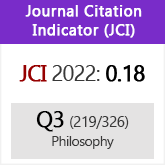Valor intrínseco y valor extrínseco en ética ambiental. Una alternativa antropocéntrica al instrumentalismo
DOI:
https://doi.org/10.3989/isegoria.2019.061.13Palabras clave:
Antropocentrismo, biocentrismo, ecocentrismo, argumento del último hombre, sentimentalismoResumen
En primer lugar, el artículo se propone especificar el debate entre no-antropocentristas y antropocentristas como uno entre quienes defienden que el ambiente tiene valor intrínseco, esto es, independiente de cualquier relación con lo humano; pero moralmente vinculante, y quienes lo niegan, esto es, afirman que solo tiene valor extrínseco. El artículo argumenta a favor de la segunda opción, pero defiende que esto no debe ser un obstáculo para desarrollar ciertas preocupaciones ambientalistas, pues el valor extrínseco no se reduce al instrumental. En relación a esto, se presenta el sentimentalismo como una alternativa según la cual hay formas de valoración de las cosas como fines en sí mismas y no solo como medios.
Descargas
Citas
Arias Maldonado, M. (2011). Hacia un constructivismo realista: de la naturaleza al medio ambiente. Isegoría: Revista de Filosofía Moral Y Política, (44), 285-301. https://doi.org/10.3989/isegoria.2011.i44.731
Bradley, B. (2006). Two Concepts of Intrinsic Value. Ethical Theory and Moral Practice, 9(2), 111-130. https://doi.org/10.1007/s10677-006-9009-7
Callicott, J. B. (1984). Non-antropocentric Value Theory and Environmental Ethics. American Philosophical Quartely, 21(4), 299-309.
Callicott, J. B. (1989). In Defense of the Land Ethic. Albania: SUNY Press.
Carter, A. (2010). Biodiversity and All That Jazz. Philosophy and Phenomenological Research, 80(1), 58-75. https://doi.org/10.1111/j.1933-1592.2009.00310.x
D'Arms, J., & Jacobson, D. (2000). Sentiment and Value. Ethics, 110(4), 722-748. https://doi.org/10.1086/233371
Frankfurt, H. (2004). The Reasons of Love. Princeton: Princeton University Press.
Frankfurt, H. (2007). Necesidad, volición y amor. Madrid: Katz. https://doi.org/10.2307/j.ctvm7bchd
Gilligan, C. (1982). In a Different Voice: Psychological Theory and Women's Development. Cambridge, Mass; London: Harvard University Press.
Gruen, L. (1997). Revaluing Nature. In K. J. Warren (Ed.), Ecofeminism: Women, Culture, Nature (pp. 356-374). Bloomington: Indiana University Press.
Gudynas, E. (2010). La senda biocéntrica: valores intrínsecos, derechos de la naturaleza y justicia ecológica. Tabula Rasa, (13), 45-71. https://doi.org/10.25058/20112742.404
Herguedas, F. A. (2006). Del valor intrínseco de la naturaleza. Isegoría: Revista de Filosofía Moral Y Política, (34), 261-275. https://doi.org/10.3989/isegoria.2006.i34.14
Kasperbauer, T. J. (2015). Naturalizing Sentimentalism for Environmental Ethics. Environmental Ethics, 37(2). https://doi.org/10.5840/enviroethics201537219
Korsgaard, C. M. (1996). Two Distinctions in Goodness. In Creating the Kingdom of Ends (pp. 249-274). Cambridge: Cambridge University Press. https://doi.org/10.1017/CBO9781139174503.010
Lo, Y. S. (2006). Making and Finding Values in Nature: From a Humean Point of View. Inquiry, 49(2), 123-147. https://doi.org/10.1080/00201740600576894
Mackie, J. L. (1990). Ethics: Inventing Right and Wrong. London and New York: Penguin Books Limited.
McDowell, J. (1998a). Aesthetic Value, Objectivity, and the Fabric of the World. In Mind, value and reality (pp. 112-130). Cambridge, Mass: Harvard University Press.
McDowell, J. (1998b). Might there be external reasons? In Mind, value and reality (pp. 95-111). Cambridge, Mass: Harvard University Press.
McDowell, J. (1998c). Values and Secondary Qualities. In Mind, value, and reality (pp. 131-150). Cambridge, Mass: Harvard University Press.
McShane, K. (2007). Why environmental ethics shouldn't give up on intrinsic value. Environmental Ethics, 29(1), 43-61. https://doi.org/10.5840/enviroethics200729128
McShane, K. (2011). Neosentimentalism and Environmental Ethics. Environmental Ethics, 33(1), 5-23. https://doi.org/10.5840/enviroethics20113313
Moore, G. E. (1993). Principia Ethica. Revised Edition. (T. Baldwin, Ed.). Cambridge: Cambridge University Press.
Neira Brito, F. (2006). Representaciones de la naturaleza en la Amazonía ecuatoriana: ¿subsistencia local o conservación global? Iconos. Revista de Ciencias Sociales, (25), 57-65. https://doi.org/10.17141/iconos.25.2006.171
Nichols, S. (2004). Sentimental Rules. Oxford: Oxford University Press. https://doi.org/10.1093/0195169344.001.0001
Norton, B. G. (1984). Environmental Ethics and Weak Anthropocentrism. Environmental Ethics, 6(2), 131-148. https://doi.org/10.5840/enviroethics19846233
Norton, B. G. (1991). Toward Unity Among Environmentalists. Nueva York: Oxford University Press.
O'Neill, J. (1992). The Varieties of Intrinsic Value. Monist, 75(2), 119-137. https://doi.org/10.5840/monist19927527
Peterson, M., & Sandin, P. (2013). The Last Man Argument Revisited. Journal of Value Inquiry, 47(1), 121-133. https://doi.org/10.1007/s10790-013-9369-x
Pigrau Solé, A. (Ed.). (2013). Pueblos indígenas, diversidad cultural y justicia ambiental. Un estudio de las nuevas constituciones de Ecuador y Bolivia. Valencia: Tirant lo Blanch.
Plumwood, V. (1997). Androcentrism and Anthropocentrism: Parallels and Politics. In K. J. Warren (Ed.), Ecofeminism: Women, Culture, Nature (pp. 327-355).
Bloomington, Indianapolis: Indiana University Press.
Prinz, J. J. (2007). The Emotional Construction of Morals. Cambridge: Cambridge University Press.
Robertson, J. (2001). Internalism, Practical Reason, and Motivation. In E. Millgram (Ed.), Varieties of Practical Reasoning (pp. 127-151). Cambridge, Mass: Oxford University Press.
Rolston, H. (1988). Environmental Ethics. Philadephia: Temple University Press.
Routley, R. (1973). Is There a Need for Environmental Ethics? Proceedings of the XVth World Congress of Philosophy, 205-210. https://doi.org/10.5840/wcp151973136
Singer, P. (2011). Practical Ethics. London and Stanford: Cambridge University Press. https://doi.org/10.1017/CBO9780511975950
Slote, M. (2010). Moral Sentimentalism. Oxford: Oxford University Press. https://doi.org/10.1093/acprof:oso/9780195391442.001.0001
Tafalla, M. (2005). Por una estética de la naturaleza: la belleza natural como argumento ecologista. Isegoría: Revista de Filosofía Moral Y Política, (32), 215-226. https://doi.org/10.3989/isegoria.2005.i32.445
Taylor, P. (1986). Respect for Nature. Princeton: Princeton University Press.
Weber, Z. (2017). Intrinsic Value and the Last Last Man. Ratio, 30(2), 165-180. https://doi.org/10.1111/rati.12133
Williams, B. (1981). Internal and external reasons. In Moral Luck. Philosophical Papers 1973-1980. Cambridge: Cambridge University Press. https://doi.org/10.1017/CBO9781139165860
Descargas
Publicado
Cómo citar
Número
Sección
Licencia
Derechos de autor 2019 Consejo Superior de Investigaciones Científicas (CSIC)

Esta obra está bajo una licencia internacional Creative Commons Atribución 4.0.
© CSIC. Los originales publicados en las ediciones impresa y electrónica de esta Revista son propiedad del Consejo Superior de Investigaciones Científicas, siendo necesario citar la procedencia en cualquier reproducción parcial o total.Salvo indicación contraria, todos los contenidos de la edición electrónica se distribuyen bajo una licencia de uso y distribución “Creative Commons Reconocimiento 4.0 Internacional ” (CC BY 4.0). Puede consultar desde aquí la versión informativa y el texto legal de la licencia. Esta circunstancia ha de hacerse constar expresamente de esta forma cuando sea necesario.
No se autoriza el depósito en repositorios, páginas web personales o similares de cualquier otra versión distinta a la publicada por el editor.














